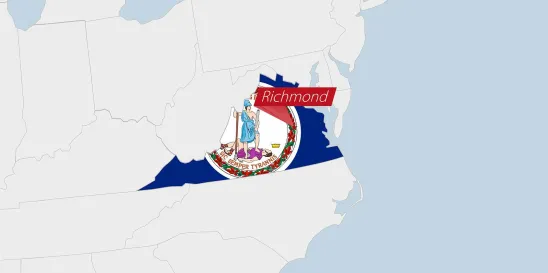Virginia is currently one of just two states, along with Mississippi, without state-court class actions. But in the most recent legislative session, the General Assembly passed Senate Bill 259, which would create a class action mechanism in Virginia state courts. Under Virginia law, Governor Youngkin can sign the bill, veto it, do nothing (which permits it to become law)—or he can propose amendments to the bill, which would then be sent back to the General Assembly at the “veto session” in April. Governor Youngkin should veto the bill—or, in the alternative, he should propose an amendment to protect Virginia businesses from the threat of outrageous statutory damages claims under the Virginia Consumer Protection Act.
Statutory Damages Under the VCPA
Businesses operating in Virginia already face the risk of class actions in federal courts. Senate Bill 259 incrementally increases the risk to businesses in Virginia to the extent that it provides an avenue for class actions that could not be filed in federal court under the Class Action Fairness Act—e.g., class actions with an aggregate amount in controversy of less than $5 million or class actions that only involve Virginia plaintiffs and Virginia defendants.
However, Senate Bill 259 poses another, even greater risk that is likely an unintended consequence of the legislation. Senate Bill 259 could result in wider availability of statutory damages under the Virginia Consumer Protection Act, Va. Code Ann. § 59.1-196 et seq. (“VCPA”), in amounts that could be ruinous to Virginia businesses in federal or state court—i.e., $500 per violation, including for absent class members. If Governor Youngkin plans to sign the bill, he should take the opportunity to amend the code sections to clarify that the statutory damages are not available to classes asserting claims under the VCPA. This amendment should be drafted in a way that ensures the limitation applies to class actions in both state and federal courts.
In consumer class actions, the threat of statutory damages exerts hydraulic pressure on defendants to settle. Often in consumer class actions, each class member’s claim will be worth a few dollars at most, based on the difference in value between what a consumer paid and the value of the product he actually received. For instance, a class of 100,000 members might have aggregate damages of $1,000,000. But if the applicable state consumer protection law provides for statutory damages, the threat to the defendant snowballs. The VCPA provides for $500 statutory damages per violation. Va. Code Ann. § 59.1-204(A). If class members can state a claim for statutory damages, that 100,000-member class, which has actual damages of just $1,000,000, can suddenly threaten a judgment of $50,000,000.
Historically, some federal courts held that because Virginia does not have a class action mechanism under state law, the VCPA’s statutory damages are not available in the class action context. That is the approach that is most protective of businesses operating in Virginia—consumers can still recover actual damages, but not windfall statutory damages. If Virginia adopts a class action mechanism for its state courts, that argument will vanish: defendants will no longer be able to argue in federal court that the VCPA’s statutory damages are not available in federal class actions.
It is important to note that even now, some federal courts have held that VCPA statutory damages are available in class actions, because Virginia’s lack of a class action mechanism is a procedural issue rather than a substantive limitation found in the VCPA itself. See, e.g., In re Hardieplank Fiber Cement Siding Litig., No. 12-MD-2359, 2013 WL 3717743, at *17 (D. Minn. July 15, 2013) (denying motion to dismiss VCPA class action allegations because “the lack of a class action mechanism [under Virginia law] is a procedural matter, rather than a substantive law defining the types of rights and remedies available under the VCPA itself”); In re Myford Touch Consumer Litig., No. 13-cv-03072-EMC, 2016 WL 7734558, at *27 (N.D. Cal. Sept. 14, 2016) (“Because Virginia’s class action ban is not part of the VCPA, and applies outside the context of the VCPA, it is procedural rather than substantive, and precluded by Rule 23.”).
These courts’ decisions are based on Shady Grove Orthopedic Associates, P.A., 559 U.S. 393 (2010), in which the Supreme Court held that some state-law procedural limitations on class statutory claims do not apply in federal court. Under Shady Grove, a state law restriction on asserting a particular type of claim on a classwide basis does not preclude Rule 23 certification of a class asserting that claim in federal court, because the restriction is procedural rather than substantive in nature. However, even under Shady Grove, a class may not proceed under Rule 23 in contravention of any substantive provision of state law, because in those circumstances, application of Rule 23 would have the effect of defining or expanding “the scope of [a] state-created right.” Id. at 423 (2010) (Stevens, J., concurring); id. at 453-58 (Ginsburg, J., dissenting).
How to Limit VCPA Statutory Damages in State and Federal Class Actions
In the wake of Shady Grove, states seeking to limit the application of consumer-protection statutory damages in both state and federal class actions have done so by enacting substantive limitations on statutory damages. That is what Virginia should do here if it is going to adopt a class mechanism for state courts. Governor Youngkin can use Senate Bill 259 as a vehicle to amend the VCPA, adopting a provision that substantively prohibits the assertion of a class claim under the VCPA. See, e.g., Tenn. Code § 47-18-109(g) (code section creating private right of action under TCPA states “[n]o class action lawsuit may be brought to recover damages for an unfair or deceptive act or practice declared to be unlawful by this part.”); Ala. Code § 8-19-10(f); Ark. Code Ann. § 4-88-113(f)(1)(B); La. Rev. Stat. § 51:1409(A); Miss. Code Ann. § 75-24-15(4). Such a limitation would apply in both state and federal court. “[T]he class action limitation in the Alabama DTPA,” for example, “is intertwined with the state right as it appears in the substantive section of the Alabama Code, applies only to the Alabama DTPA, is included as a subdivision of the section that would otherwise make it possible for Plaintiffs to sue for damages and expressly states that it is intended to act as a substantive limitation on the substantive rights created by the statute.” Ford v. Hyundai Motor Am., No. 20-cv-0890 (FLA), 2021 WL 7448507, at *26 (C.D. Cal. Oct. 5, 2021).
A bill that creates a state court mechanism for class actions while simultaneously clarifying that plaintiffs cannot assert class claims for statutory damages under the VCPA would arguably be a net win for Virginia businesses. Moreover, it would be consistent with the original intent of the statutory damages provision of the VCPA: to create an incentive for a single plaintiff to bring a consumer protection claim when the value of his claim is negligible. By the sponsors’ admission, the class mechanism created by Senate Bill 259 is intended to achieve the same thing. Permitting both statutory damages and class treatment provides a windfall to class members and in terrorem damages against Virginia businesses.




 />i
/>i

